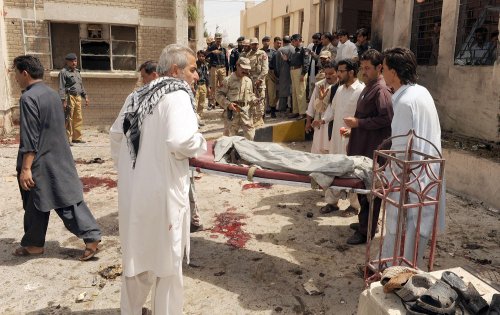Here is a quick look at the security, and law & order situation in Balochistan, Pakistan’s largest province, according to the three largest Urdu dailies being published in Islamabad
- Within the first three weeks of April 2012, 67 people have been killed; 90% of these in Quetta, including women and children.
- A total of 20 people have been injured in these attacks. Meaning that these acts of terrorism are not random acts in the form of bombs or indiscriminate firing incidents that would leave less dead and more injured. These are well planned and schemed activities where people, and places, are “chosen” to be killed.
- A total of 47 people have been kidnapped, including one person from an NGO working in the provincial capital, Quetta.

Supreme Court’s actions and remarks
On April 1, the Chief Justice of Pakistan, Mr. Justice Iftikhar Muhammad Chaudhry, constituted a special 3-member bench to hear the situation in Balochistan, and particularly in Quetta. He landed in Quetta on April 2 and headed the hearing the same day.
The following are Justice Chaudhry’s statements depicting the state and situation of governance, law and order - and provincial and federal governments’ competence to handle the situation:
- April 4: Expressing utter dissatisfaction over the report presented by Balochistan government regarding target killing, kidnapping for ransom, mutilated bodies and missing persons, he said: “We should not be forced to call someone else for implementation of judicial verdicts.” By “someone else,” he meant the Pakistani Army.
- On April 6, Justice Chaudhry ordered that the cases against Provincial Ministers involved in kidnapping for ransom be registered. No progress has been made on his order as of April 23.
- April 7: No one is safe in Balochistan.
- April 9: Baloch people should be saved from cruelty and brutality.
- April 13: Balochistan is burning; Balochistan's Inspector General and Superintendent of Police should be sent to prison after suspension.
- April 14: Law enforcement agencies have failed in Balochistan.
- April 18: Federal and provincial governments have failed in Balochistan.
Total failure of politics
On April 12, Daily Jang reported that the Prime Minister’s special parliamentary committee on the issues of Balochistan, and Karachi, have failed even to meet after it was announced in September 2011.
On April 8, the Chief Minister Balochistan, Aslam Raisani, implied that the Federal Government is not taking the province seriously. He said that a separatists could not separate Balochistan from Pakistan however; the policy makers sitting in Islamabad would do this task through their policies. These are the words of Pakistan People Party’s Chief Minister about his own party’s actions in central government.
Chief Minister Raisani’s younger brother and a Pakistan People Party Senator, Mir Lashkari Raisani met the President Asif Ali Zardari on April 10 and complained about the government’s handling of the situation in Balochistan. The President offered him to become his advisor on Balochistan but he turned down the offer. He later resigned from the party membership and the Senate of Pakistan on April 17.
Hope?
The Pakistan People Party government hasn’t been able to take any worthy step after the announcement of the Balochistan Rights Package in November 2009. The government has been in power since March 2008 and the situation in Balochistan during the period has deteriorated. There is a little chance that the situation could improve during the remaining one year.
It seems that this issue has been left for the next political government to take care of. The nationalist parties are expected to take part in the next elections and with them in power, the situation could get better. And that is the hope.







